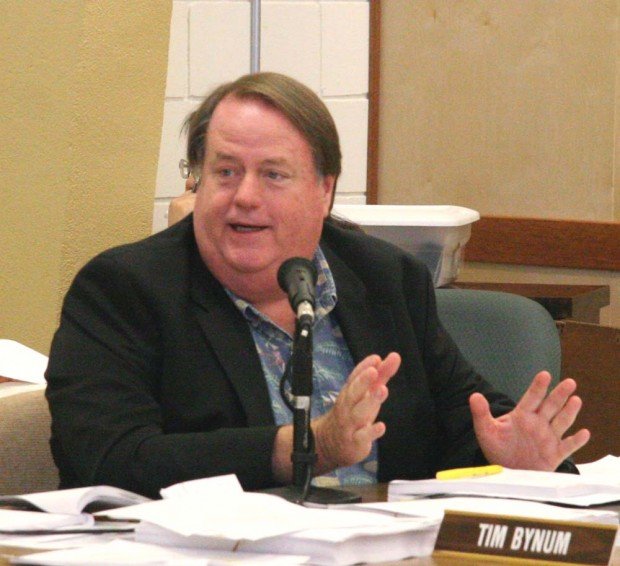NAWILIWILI — A last-minute amendment to the county’s budget for Fiscal Year 2012 would have increased real property taxes for hotels and resorts, but the Kaua‘i County Council’s Committee of the Whole voted to keep the status quo. “We have
NAWILIWILI — A last-minute amendment to the county’s budget for Fiscal Year 2012 would have increased real property taxes for hotels and resorts, but the Kaua‘i County Council’s Committee of the Whole voted to keep the status quo.
“We have the lowest tax rates in the hotel and resort category of any island by far,” Councilman Tim Bynum said on Wednesday during a special committee meeting at Council Chambers in Nawiliwili.
Hotels and resorts on Kaua‘i pay $7.53 per $1,000 of assessed value for their property taxes. On Maui the rate is $9.10, on the Big Island it is $9.85, and on O‘ahu it is $12.40.
Bynum proposed to increase Kaua‘i’s RPT rates for hotels and resorts by 60 cents, which would still keep the island with the state’s lowest tax rates, while bringing in an extra $1.19 million to county coffers.
Bynum was concerned that since 2005, property taxes for homesteads have been growing, thanks to a 2 percent cap put in to protect homeowners against ballooning property prices then. But with the global economic crisis, property value continues to fall while taxes for homeowners increase each year because of the cap.
Hotel and resort RPT revenues grew steadily until 2009, when it peaked at $17.57 million. But in 2010 the revenues dropped to $15.38 million, and is forecasted to drop to $14.94 in 2011.
The amendment failed on a 2-4 vote, with Council members Bynum and JoAnn Yukimura supporting it, and Council members KipuKai Kuali‘i, Nadine Nakamura, Dickie Chang and Chair Jay Furfaro opposing it. Councilman Mel Rapozo was on O‘ahu on official business.
While Bynum’s proposed amendment to increase RPT rates from hotels and resorts failed, another piece of legislation he introduced Wednesday unanimously passed first reading. This bill would increase homeowners’ tax exemptions by $20,000.
“That would give immediate relief for 12,600 homeowners on Kaua‘i,” said Bynum, adding that he is trying to schedule a public hearing soon.
In 2004 the RPT revenues for the homestead class (owner-occupied home) were $4.51 million. The next year tax revenues collected from homesteads came in at $5.37 million, and it has kept growing each year. In 2010 RPT revenues for homesteads peaked at $8.12 million, and is forecasted to come in at $8.95 million in 2011.
Before moving on to other items on the meeting’s agenda, Furfaro said the council is looking forward to a commitment from the administration to “propose some real comprehensive tax reform for the County of Kaua‘i in all categories within the next 14 to 60 days.”
The last time the county pursued substantial tax reform was in 2008, but the status quo prevailed at the time.
How much is
Kaua‘i worth?
According to county documents, the value of all properties combined on the entire island peaked at $19.38 billion in 2008. That number has dropped each year since then. In 2010 it was $16.76 billion, and it is forecasted to drop to $15.85 billion in 2011. Back in 2002, the earliest year provided in the documents, the net valuation was $6.59 billion.
In 2010, Homesteads accounted for $4.09 billion, or 24.45 percent of the value of the island’s properties. In 2011, that number is forecasted to decrease to $3.70 billion, or 23.39 percent.
Despite homestead values dropping since 2007, when it peaked at $5.34 billion, their taxes have increased.
The value for hotels and resorts peaked in 2009 at $2.40 billion. In 2011, that number is forecasted to come in at $2.05 billion. Their taxes, accordingly, keep dropping.
• Léo Azambuja, staff writer, can be reached at 245-3681 (ext. 252) or lazambuja@ thegardenisland.com.


